- Diagnostics
- 1 min read
Study suggests stem cells help determine new schizophrenia drugs
Neurodegenerative and psychiatric illnesses can be brought on by inflammation and an overactive immune system in the brain, which results in the loss of synapses and the death of neurons.
The immunological protein C4 is elevated in the brains of schizophrenia patients, and increasing C4 levels due to differences in copy number are linked to an increased chance of developing schizophrenia. Patients with schizophrenia may benefit from treatments that lower C4 levels in the brain and reduce inflammation, but these treatments are not yet accessible.
Brain cells called astrocytes regulate the immune response and inflammatory environment in the brain by secreting immune proteins such as C4. Consequently, astrocytes are a primary target for C4-lowering therapies. To identify effective drugs, Francesca Rapino, Lee Rubin, and colleagues from Harvard University, USA have developed an efficient method to make large numbers of C4-secreting human astrocytes from stem cells.
In the study, the researchers followed-up with a screen of 464 drugs and identified a small group of about 20 that reduced C4 secretion from astrocytes. These drugs were effective both in healthy astrocytes and in astrocytes made from Schizophrenia patients' stem cells.
This research opens up new avenues for studying inflammatory responses and their regulation in human astrocytes and serves as a platform to identify therapeutic drugs in large-scale screening approaches.



COMMENTS
All Comments
By commenting, you agree to the Prohibited Content Policy
PostBy commenting, you agree to the Prohibited Content Policy
PostFind this Comment Offensive?
Choose your reason below and click on the submit button. This will alert our moderators to take actions